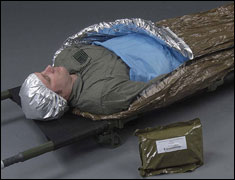New equipment helping wounded Soldiers in Iraq

By Karen Fleming-Michael
FORT DETRICK, Md. (Army News Service, Jan. 10, 2006) – Crucial equipment to help wounded Soldiers in Iraq has been fielded over the past five months, thanks to a new system of communication between medical units in theater and experts here.
Anticipating what materiel the Army’s medical professionals need before they deploy is one of the missions of the U.S. Army Medical Research and Materiel Command. Now the command has a system in place that lets Army medical units tell the command what they need even after they’ve deployed.
By tagging along as a medical expert on the Army Materiel Command’s Field Assistance in Science and Technology team, in July Maj. Jurandir Dalle Lucca was the command’s first Army Medical Department officer to go into Iraq and find out what equipment or knowledge medical units lacked.
As a result of the FAST trip, about 4,000 hypothermia kits have been fielded to Iraq, along with 60 flight-certified pumps to administer pain medicine, and other requested medical equipment.
New equipment saving lives
“The opportunity to spend time talking and working with so many dedicated and highly professional men and women on the battlefield has been the most rewarding experience I ever had,” Dalle Lucca said. “It is a different perspective to see products, such as the chitosan bandage and the new tourniquets, actually saving lives in front of you.”
The command had been trying to link up with FAST teams for a while, said Col. Harry Slife of the U.S. Army Medical Research and Materiel Command.
“The way we’re responsible for cradle-to-grave medical materiel, AMC is responsible for cradle to grave logistics for everything except medical,” he said. “When they got over there, their mission was to see how things were working, how there could be some materiel solutions to problems that Soldiers were experiencing or doctrinal changes or training or simply modifications to existing materiel.”
Team visits 40 units
The FAST team members found they were at times being asked questions about medical materiel that they couldn’t answer. That’s when a call for volunteers went out to Army biochemists asking them if they wanted to join up with the next four FAST teams, typically composed of an officer, a noncommissioned officer and a scientist.
When Dalle Lucca arrived in theater, he traveled in convoys, in Blackhawks, C-17s and C-130s to give his pitch to 40 units across Iraq — from Baghdad to Tikrit, from Basrah to Mosul — speaking with medical personnel at battalion aid stations, forward surgical teams and combat surgical hospitals.
At the end of his travels, he’d gathered and forwarded 15 projects, 30 reported issues and numerous requests for information from the field.
Requests from theater continue
“Due to the apparent success of our mission, lately I have been receiving several phone calls from all over the theater, including Navy doctors that want to share their experiences and ideas for improvement,” Dalle Lucca said.
One issue he assisted with was helping patients manage pain during their evacuations from or stays at combat support hospitals. When he brought the pain-management issue to the Medical Research and Materiel Command’s attention, a group at the headquarters located a flight-certified pump that lets patients give themselves doses of pain-relief medication.
Within weeks, 60 pumps were purchased and sent to four combat support hospitals in the theater.
Finding the expert
Acting on the issues Dalle Lucca found meant putting the right people from the command at a meeting, Slife said. The group at the headquarters wants to find an expert who will take the issue head on and resolve it.
Issues aren’t just about providing a piece of equipment. Dalle Lucca also helped identify problems with educating units new to the theater on how to order medical supplies and training combat lifesavers to use the correct resuscitation fluids.
“Our role (at headquarters) will be as the quarterback, to hand the ball off,” he said. “Once (a concern) is handed off, we have to allow
(experts) to run with it.”
Solving hypothermia complications
Because combat support hospitals typically saw 10 patients a month who were suffering from complications of hypothermia during medical evacuations, Dalle Lucca began searching for yet another solution.
“Until now, the policy here was to wrap the patient with body bags made of plastic to help prevent heat loss during MEDEVAC,” he said. “We were able to bring important new tools, such as hypothermia prevention kits and temperature sensor catheters, which are sure to cause a dramatic decrease in complications associated with hypothermia.”
As a result of the effort, 4,000 kits were fielded, as well as core temperature monitors, to prevent hypothermia.
No Monday-morning quarterbacking
Slife said that though the command “could do a lot of Monday morning quarterbacking, saying we shoulda, coulda, woulda had something two or three years ago,” the important thing is being responsive for the Soldiers’ needs.
“I don’t care what precipitated the thought process as long as we’re thinking about it,” he said. “The issue is getting the materiel in the hands of the folks who need it most in short order and having great confidence that what you’re providing them is going to meet the need.”
(Editor’s note: Karen Fleming-Michael writes for the U.S. Army Medical Research and Materiel Command Public Affairs Office at Fort Detrick, Md.)